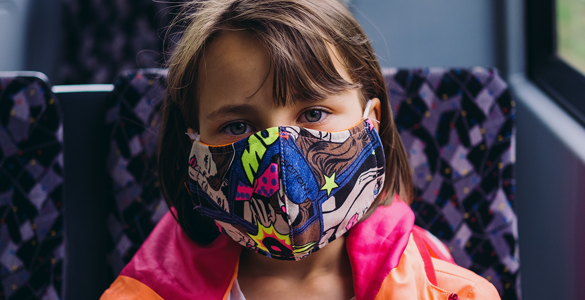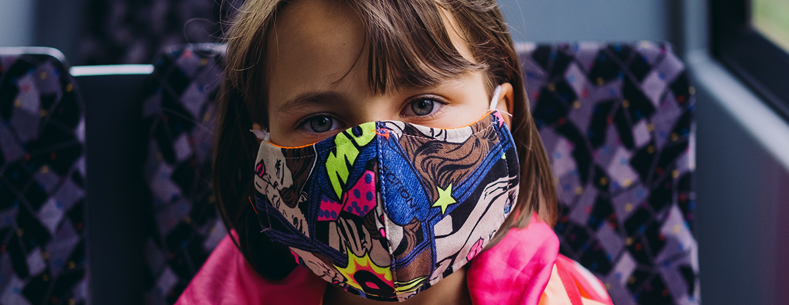Now more than ever, I feel a real sense of duty to make sure we become the voice of the voiceless and ensure the protection of every child’s rights sits squarely in the centre of every decision by our Government and public services.
These are the words of the Children’s Commissioner, Sally Holland, in her latest Annual Report 2019-20. In it she gives her verdict about the lives of children and young people in Wales. Members of the Senedd will have their say on these issues when the report is the focus of a Senedd debate next Tuesday 20 October.
‘Collateral damage’
The Covid-19 crisis has dramatically changed the lives of Wales’ children: with schools and childcare settings closed for long periods, exams cancelled, lectures being taught on-line, playgrounds shut, opportunities to socialise cut off and a drop in the numbers of children being referred to social services. Unsurprisingly the NSPCC reported ‘unprecedented demand’ for its Childline service and there are concerns about how the pandemic is affecting children and young people’s mental health, both now and in the long-term.
The Senedd’s Children, Young People and Education (CYPE) Committee heard from the Royal College of Paediatrics and Child Health that children and young people could ‘suffer more from collateral damage and unintended consequences from the restrictions due to the Covid 19 epidemic than from the infection itself’.
The Committee has closely scrutinised the Welsh Government’s response to the pandemic, and its interim findings were discussed by Members of the Senedd in Plenary, in July 2020. Subsequently the Committee was recalled in August to ask questions of the Minister for Education, Qualifications Wales and the WJEC about out the impact of Covid-19 on young people's examinations results this year. More recently, in September 2020, the Committee wrote to all Wales' University-Vice Chancellors seeking information about the arrangements to support students at the beginning of the Autumn Term.
‘Wicked problems’
While Covid-19 may have changed the lives of Wales’ children forever, many of the issues in the Commissioner’s most recent report arguably tell us the same old stories – the problems that are proving the most difficult to solve. The report’s focus is on the period March 2019- April 2020 and it includes a wide range of longstanding concerns such as the quality of children’s mental health services, children still living in poverty, and children in care not getting the specialist support they need. These are some of the'wicked problems' which greatly affect children and young people’s lives and are likely to be made worse by Covid-19. The need to get the Welsh Government’s policy approaches right has arguably never been more important.
Significant changes
There are also some significant changes which the Commissioner’s report focuses on, including:
- a new law, due to come into force early 2022, which means that it will no longer be legal for children in Wales to be physically punished. The Commissioner says her office will continue to participate in the stakeholder groups around public messaging and parenting support over the coming years, as part of the commitments made during the passage of the Act.
- the number of children involved in the youth justice system, which has reduced significantly in the last ten years, from approximately 5,000 First Time Entrants to the System in 2009 to approximately 550 in 2019. Yet the Commissioner says ‘progress has been slow in implementing the ambitious Youth Justice Blueprint since its publication.’
- elective home education, an issue which the Commissioner has made recommendations about in her last four annual reports and on which she has called for legal changes. Pre-Covid the Welsh Government consulted on draft statutory guidance and regulations to address the Commissioner’s concerns. However in June 2020, the Minister for Education announced that, due to the significant impact of Covid 19 on Welsh Government resources, it was not possible to complete the planned work within this Senedd term. In September 2020, the Children’s Commissioner then announced her intention to use her statutory powers for the first timeto review the Welsh Government’s actions in this regard.
- the Additional Learning Needs and Education Tribunal (Wales) Act 2018 which seeks to address longstanding concerns about the support provided to children with special educational needs. However, in autumn 2019 the Welsh Government announced a delay to the implementation of the Act. The Commissioner notes that the delayed and re-drafted Additional Learning Needs (ALN) code of practice must be laid before the Senedd in order to take forward the implementation of the 2018 Act. She also says it’s essential that the additional investment for the ALN sector budget for 2020-21 is not a one-off, and this must be continued as the new system develops to ensure its success.
Happy, healthy and safe: A manifesto for Wales’ children and young people 2021
This is Sally Holland’s penultimate Annual Report as she nears the end of her tenure as Commissioner. Tuesday’s debate will also be the last time Members of this Fifth Senedd will consider a Children’s Commissioner’s verdict on progressing children’s rights in Wales.
The Commissioner will therefore no doubt be hoping that all political parties seriously consider her Manifesto for Children and Young People 2021 in advance of next year’s Sixth Senedd elections.
Members may also be thinking about the process of appointing the next Commissioner, given the Welsh Government rejected the CYPE Committee’s August 2020 recommendation that it should, at the earliest legislative opportunity, transfer responsibility for the appointment, accountability, and funding of the Children’s Commissioner for Wales to the Senedd.
You can watch Senedd Members debate these and other issues affecting children and young people on Senedd TV at around 6.15 pm on Tuesday 20 October.
Article by Sian Thomas, Senedd Research, Welsh Parliament






